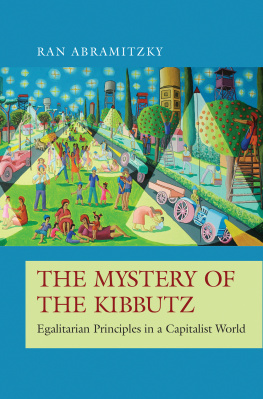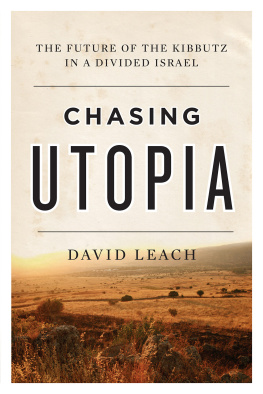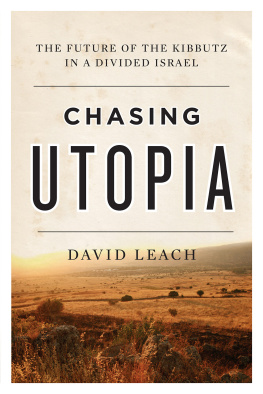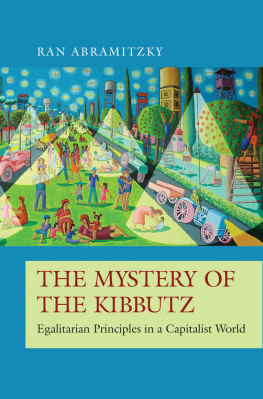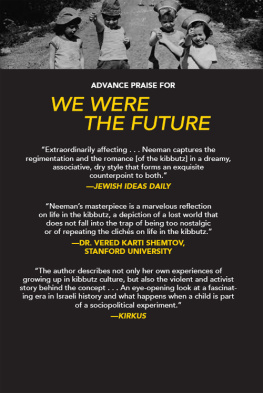First published 1986 by Transaction Publishers
Published 2017 by Routledge
2 Park Square, Milton Park, Abingdon, Oxon OX14 4RN
711 Third Avenue, New York, NY 10017, USA
Routledge is an imprint of the Taylor & Francis Group, an informa business
Copyright 1986 by Taylor & Francis.
All rights reserved. No part of this book may be reprinted or reproduced or utilised in any form or by any electronic, mechanical, or other means, now known or hereafter invented, including photocopying and recording, or in any information storage or retrieval system, without permission in writing from the publishers.
Notice:
Product or corporate names may be trademarks or registered trademarks, and are used only for identification and explanation without intent to infringe.
Library of Congress Catalog Number: 85-16433
Library of Congress Cataloging-in-Publication Data
Blasi, Joseph R.
The communal experience of the kibbutz.
Bibliography: p.
p. cm.
Includes index.
1. Kibbutzim. I. Title.
HX742.2.A3B54 1986 307.776 85-16433
ISBN 0-88738-056-5
ISBN 0-88738-611-3 (pbk.)
ISBN 0-88738-611-3 (pbk.)
I am grateful to those at Transaction, Inc., Irving Louis Horowitz, president, and Scott Bramson, publisher, for their close cooperation in inaugurating a series of books on the kibbutz with this volume.
I would like to give special thanks to my parents, Angelo and Jean, and my sister Tina, whose continuous support has been central to my life and work.
Professor Isadore Twersky, Director of the Center for Jewish Studies at Harvard University, has encouraged me personally with his warmth and understanding, and has guided the development of the Project for Kibbutz Studies at the Center with great wisdom and kindness.
The friendship and criticism of Philip Warburg have been ongoing joys; this book and the Project for Kibbutz Studies have been nourished by his abiding attention; indeed, without the continued support of the Warburg family as well as the Bydale Foundation, this work would have been impossible.
Susan Lyn Sklar was also a constant friend and helped refine ideas and plan the research in all its stages. She inspired my trip to Israel, helped edit many original documents connected with the research and took full responsibility for the group that coded the data; her influence in this work has been truly significant. Jerome Weiman of Norwood Editions published an earlier version of this book first. He had a key role in the development of kibbutz publications in the English language.
I am also indebted to Lucy Maloney Jones, who has been the editorial assistant at the Project for Kibbutz Studies for the last three years, who edited the manuscript with great care. The project would not have been possible without her hard work and dedication. I would like to thank the projects new administrative assistants, Peggy Schnoor and Elisha Frank, for their assistance and patience in preparing the final manuscript, making editorial corrections, and proofreading; and Ayelet Tabak who lent vital assitance at this stage.
Over the years, the interest and support of Mr. Akiva Levinsky of the Jewish Agency and the Hebrew Culture foundation of the United States has been central and crucial to the development of kibbutz research. Other organizations of great importance include the HaShomer HaZair Kibbutz Federation, United Kibbutz Movement (Takam), Tabenkin Institute for Kibbutz Studies, and Institute for Study and Research on the Kibbutz and the Cooperative Idea at the University of Haifa, the School of Education of the Kibbutz Movement at Oranim, Seminar Hakibbutz of Tel Aviv, and the Ruppin college of Agriculture and Industry.
Many others lent crucial assistance to this work, including my advisor, Professor Donald Oliver, Vicki Steinitz, and Joseph Featherstone, all of Harvard University; Professor Menachem Rosner, then director of the Haifa Institute for Kibbutz Studies; Professor Moshe Kerem; and Avraham Yassour and the late Professor Joseph Shepher, both of the University of Haifa. The members of Kibbutz Vatik of the HaShomer HaTzair Federation, and Kibbutz Tzair of the HaKibbutz HaMeuchad Federation contributed endless hours out of a dedication to sharing their social and educational experiences. I owe these members an unlimited debt of gratitude for their patience and honesty. Professor Yechil Abramson dedicated many afternoons to teaching me the Hebrew language. Michal Palgi, Ruth Shapiro, Schmeul Chermoni, Ruthie HaCohen, and Sara Tal all helped coordinate the research at Kibbutz Vatik. Susan Liberman, the main translator, worked diligently on the translation of documents and interviews. Terry Tivnans careful and continuous help with the long and complicated job of computer programming and printout enabled me to get the most out of the research. Mordechi Bentov of the International Communities Desk, HaShomer HaTzair Federation, and Aharon Yadlin, Israels minister of education, and the current General Secretary of the United Kibbutz Movement, provided significant encouragement and support at early stages of the project. James Keen and Cheryl Hollmann Keen, my roommates at the time of this study, helped me to appreciate deeply the value of fellowship, as they were always there to help.
This book is based in part on a research project funded by the United States Department of Health, Education, and Welfare, National Institute for Mental Health, Center for the Study of Metropolitan Problems. I am grateful to the staff of the Metro Center, especially Richard Wakefield and Eliot Liebow for their assistance. I am fortunate in having been granted the Lady Davis Fellowship at Hebrew University in Jerusalem and the Fulbright Fellowship at the University of Haifa during the period when I revised this book. Mrs. Tove Wilk of the Lady Davis Fund and Mr. Daniel Krauskopf of the United States-Israel Educational Foundation helped make my sabbatical year in Israel happy and productive. Thanks also to Sherman Starr and Sidney Troy for their generous assistance.
Many others in Israel and the United States aided me, I am also indebted to them.




